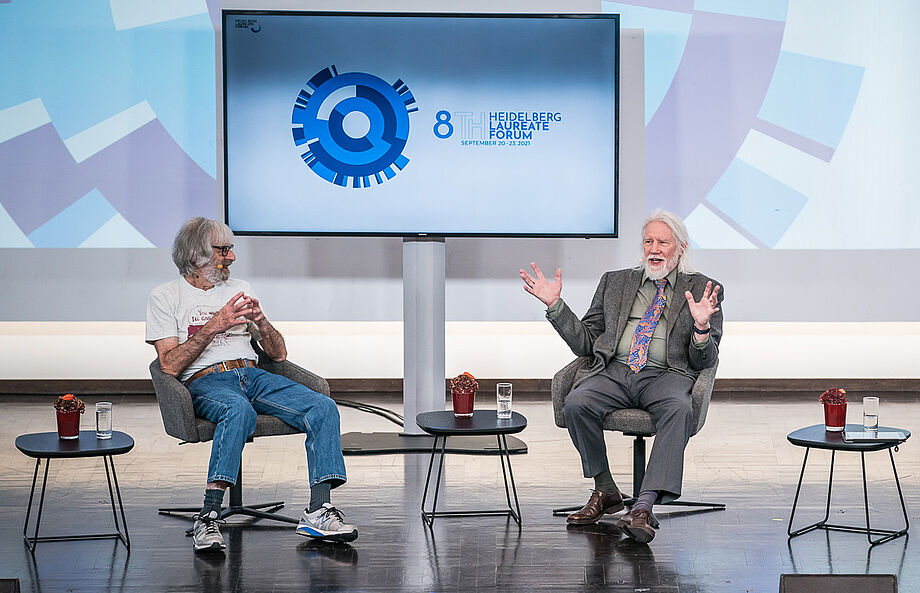The 8th Heidelberg Laureate Forum: A dynamic, digital program crafted around interactivity.
The goal of the 8th Heidelberg Laureate Forum (HLF) was evident: provide a digital platform with dynamic material where effective interaction can take place. From September 20–23, that exciting transition from theory to practice unfolded in Heidelberg.
More than 30 recipients of the most prestigious prizes in mathematics and computer science participated in the digital 8th HLF. They provided insights from their research and advice based on their experience for the selected young researchers from more than 55 countries.
"Do everything the best you can, never be satisfied with anything less," advised ACM A.M. Turing Award recipient Leslie Lamport during the opening. "Make sure you’re having fun doing it."
Various networking tools were implemented, even before the event each profile could be optimized with tags to make the search for related specializations and interests seamless. Via direct messaging and video calls, developing contacts during the 8th HLF was straightforward and effective. Another pivotal aspect of the in-person event was salvaged with 15 laureates being available for sessions where they met exclusively with small groups of young researchers.
This year’s program was threaded together by contemporary topics such as science communication, the future of science, or the ethical, societal and environmental impacts of information technology – either as focal points or indirectly debated. In addition to staple elements, distinct to this year’s event were new formats like the laureate panels and a variety of workshops prior to and during the forum.
Panel discussions like "Scientists Get Creative to Engage the Public in Science" or "Can Future Discoveries be Made by Artificial Intelligence" provided practical tactics for repairing the lines of communication and substantial content about the direction of research.
In contrast to past HLFs, there were only three laureate lectures, one designated for each discipline, plus the Lindau Lecture. Avi Wigderson, who received the Abel Prize in 2021 revealed "The Value of Errors in Proofs," while recipient of the 2020 ACM Prize in Computing, Scott Aaronson, lectured on “Quantum Computational Supremacy." Donna Strickland, who received the 2018 Nobel Prize in Physics, took participants on a trip "From Nonlinear Optics to High-Intensity Laser Physics."
This year’s Hot Topic, "Mathematics of Disease – The Science of Epidemic Modeling" analyzed why epidemic modeling is useful, how best to communicate their results, and their influence both on policy making and society at large.
One of the novel components introduced were the laureate discussions, where a panel of award recipients examined a theme that highlighted the strong connections between mathematics and computer science and their impact on society.
"I just want people to understand, it’s exciting to me," said Vint Cerf, Chief Internet Evangelist at Google and ACM A.M. Turing Award laureate. "The idea that you can convey something that’s in your head into someone else’s head, that’s amazing."
There is room to develop, but the goal set for the program of the 8th HLF and its implementation met the mark. A diverse selection of digital elements was delivered on a dynamic platform with effective tools for interactivity available. Looking forward, it is difficult to say how the 9th HLF will materialize, however, it will certainly be impacted by what has been learned during this period.
Anna Wienhard, Scientific Chairperson of the Heidelberg Laureate Forum Foundation (HLFF), closed with these remarks on meeting in-person, "I know for sure that we will try everything to make it happen, and to have an HLF that is at least as engaging and inspiring as this year’s HLF was."
Most of the sessions are available on the HLF YouTube channel: https://www.youtube.com/user/LaureateForum
Background
The Heidelberg Laureate Forum Foundation (HLFF) annually organizes the Heidelberg Laureate Forum (HLF), a networking conference where 200 outstanding young researchers in mathematics and computer science interact with the recipients of the most renowned prizes in the fields. The HLFF was established and is funded by the German foundation Klaus Tschira Stiftung (KTS), which promotes natural sciences, mathematics and computer science. The Scientific Partners of the HLF are the Heidelberg Institute for Theoretical Studies (HITS) and Heidelberg University. It is also strongly supported by the award-granting institutions, the Association for Computing Machinery (ACM), the International Mathematical Union (IMU), and the Norwegian Academy of Science and Letters (DNVA).
Press Inquiries
Nicole Schmitt, Wylder Green
Communications
Heidelberg Laureate Forum Foundation
media@heidelberg-laureate-forum.org
Telephone: +49 6221 533-389
Internet: www.heidelberg-laureate-forum.org
Facebook: www.facebook.com/HeidelbergLaureateForum
Twitter: www.twitter.com/HLForum
YouTube: www.youtube.com/LaureateForum
Science Blog: http://scilogs.spektrum.de/hlf/
Flickr: https://www.flickr.com/photos/hlforum/albums
